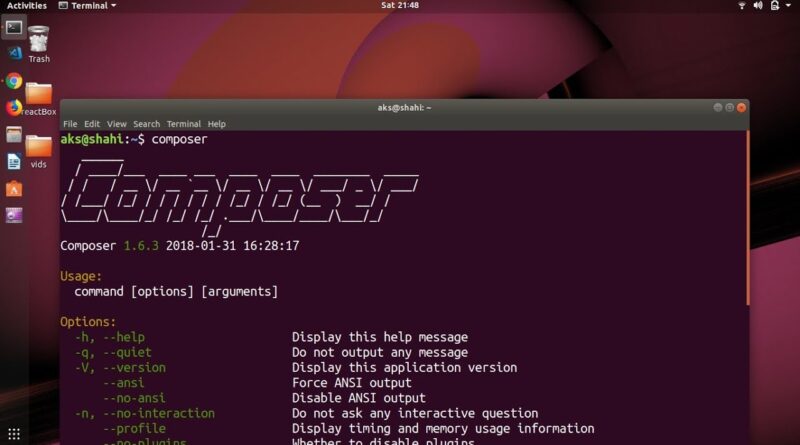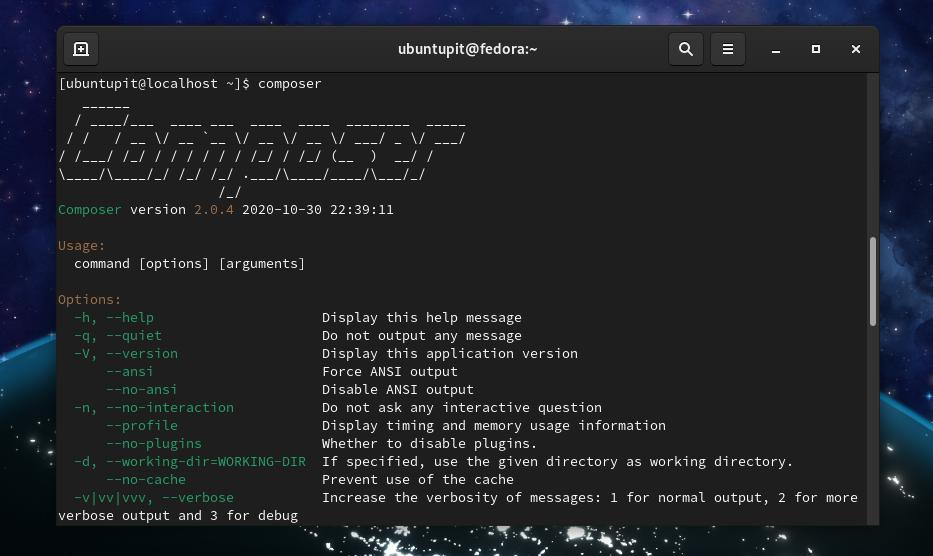
Some updates are simply to change the version number (such as from 3.2.0-4 to 3.2.0-5), while others might provide bug fixes or security improvements. Linux systems are constantly updated each day with new security fixes, kernel patches that fix bugs, and performance enhancements. Make sure PHP 5.3.2+ is installed on the server. It works best with PHP 7.0 and above, but you might get away with using PHP 5.6 or 7.1.
#COMPOSER INSTALL HOW TO#
Once that is done, it will be time to create a simple project and show you how to use Composer to download and install some packages to your project. The following steps will walk you through downloading and installing the package onto your Debian 11 server. In this article, we will show you how to install and use PHP Composer on a Debian 11 server. It also allows you to keep track of the versions used in production, staging, or development easily by defining which environment it is for through an environment variable, which you set once when starting up your application, at the beginning of bootstrap, and then forget about it afterward because it will always get altered when needed changing anything else in your codebase automatically.
#COMPOSER INSTALL UPDATE#
This means if you add new libraries to your project, you should update your composer.json file with their version number, and it will download them for you. The Composer then uses this file to download and install all the external library dependencies into our project folder and creates a dependency tree based on these details. When we use PHP composer, we define our project’s dependencies in a single text file called “composer.json.” This file contains the names and version numbers (and optionally URLs ) of the external libraries that we want to use.
#COMPOSER INSTALL CODE#
Composer will manage all dependencies for your application or library and download them in one go allowing you to quickly get back to coding instead of spending time compiling code and managing external libraries. Downloading and installing these packages manually can take hours, depending on the size of the project. It helps you manage your project’s dependencies, whether they are from Packagist, Github, or elsewhere.Ĭomposer is a real timesaver, especially when you need to use several different libraries that are incompatible with each other. Composer is a dependency manager for PHP with support for library and framework dependencies. Dependency managers aid in application development and the process of invoking libraries and frameworks. It does not store any personal data.PHP Composer is a dependency manager for PHP. The cookie is set by the GDPR Cookie Consent plugin and is used to store whether or not user has consented to the use of cookies.

The cookie is used to store the user consent for the cookies in the category "Performance". This cookie is set by GDPR Cookie Consent plugin. The cookie is used to store the user consent for the cookies in the category "Other. The cookies is used to store the user consent for the cookies in the category "Necessary". The cookie is set by GDPR cookie consent to record the user consent for the cookies in the category "Functional". The cookie is used to store the user consent for the cookies in the category "Analytics". These cookies ensure basic functionalities and security features of the website, anonymously. Necessary cookies are absolutely essential for the website to function properly.

_/\_/_/\_/_/Ĭommand Also Read: How To Install New Theme In Magento 2 and How To Optimize Magento 2 Speed Mkdir -p ~/bin mv composer.phar ~/bin/composer Note: if you do not have permission than move to local user’s bin directory by Sudo mv composer.phar /usr/local/bin/composer Now move this to system’s bin folder so that every user can access it This will create a file “composer.phar” file To set up the composer, login into your server & run following commands : but Yes you need command-line access ( SSH access ) to your system or server to install composer. It’s really easy to install composer, It doesn’t matter system root user to install composer. It installs the libraries in the specific project you want to work on. It will help you install and update the libraries. This means that Composer will pull in all the required libraries, dependencies and manage them all in one place.


It will manage the dependencies that you require in your project. The Composer is a dependency manager for PHP.


 0 kommentar(er)
0 kommentar(er)
